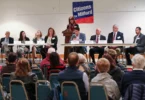Savanna Tavakoli
BU News Service
The Boston University Police Department and the Boston Police Department are stepping up their efforts to combat Boston’s opioid epidemic in the areas around the university, conducting a weekly outreach effort on BU’s Medical School campus and partnering with Project Place, an organization that provides career opportunities for the homeless and addicted populations.
According to BUPD Lieutenant Peter DiDomenica, the area surrounding Boston University’s Medical School Campus is a “hot spot” for opioid addicts. DiDomenica explained that his department is working closely with the BPD to offer comprehensive support and drug treatment plans through their community outreach efforts.
“Our idea is let’s get [officers] focused on this issue with the goal not to arrest these people but to get them the help they need,” said DiDomenica. “It’s a win-win because it helps protect our community but also addresses public safety as well.”
Officers who have been assigned to conduct the community outreach efforts will wait for someone seeking help to approach them. If a person is displaying “signs of distress,” however, officers will approach them, said DiDomenica.
“[The officers] will strike up a conversation with these guys,” said DiDomenica. “It’s a voluntary interaction.’’
In addition to conducting weekly outreach efforts, Boston University allocated $79,000 to Project Place in early September 2017. The funding is the university’s second major contribution to Project Place since partnering with the organization in the fall of 2016.
According to Sarah Argeropoulos, Development Manager of Events and Special Projects for Project Place, Project Place has developed multiple community outreach programs in an effort to tackle Boston’s opioid epidemic.
“Clean Corners…Bright Hopes,’’ one of the organization’s many neighborhood initiatives, provides city-wide janitorial work for formerly homeless and drug-addicted populations who act as “ambassadors” for Project Place, said Argeropoulos.
“The opioid crisis has touched every demographic,” said Argeropoulos. “[The epidemic] gets a lot of attention because it’s touching wealthy white communities, as opposed to the crack epidemic.”
According to Boston University’s Executive Director of Media Relations, Colin Riley, the city’s homeless and addicted populations dispersed across Boston after Mayor Marty Walsh closed the bridge to Boston’s Long Island. For years, Long Island served as an isolated location where people suffering from homelessness and drug addiction could receive treatment, housing, and medical care.
“Hundreds of people were displaced and forced to relocate to different areas of the city,” said Riley.
Argeropoulos echoed Riley’s statements, saying, “The problem has gotten worse since the Long Island shelter was closed. The people who were getting treatment and medical care had nowhere to go after that.”
The Boston Police Department has also seen a growing number of loose needles discarded in public parks and on city sidewalks as a result of intravenous opioid use, said Sergeant James Freeman of District Four.
The cleanup, however, has become increasingly dangerous due to a surge in synthetic opioids such as Fentanyl and Carfentanil, the latter of which is used as an elephant tranquilizer.
“Police departments have to be really careful because these new drugs are now being mixed in with heroin,” said DiDomenica, “If Carfentanil or Fentanyl is found, the area immediately becomes a hazmat site. It becomes a hazard not only for the users but for the first responders.”
Despite precautionary measures, two police officers for Boston’s Fourth District have been pricked with dirty needles while making arrests and were put on the “AIDS Cocktail” to ensure their safety, according to Freeman.
“We’re really not supplied with any protective garments other than rubber gloves, and we know they’re not going to stop a needle prick,” said Freeman.
In addition to police efforts, Mayor Walsh implemented the Mobile Sharps Team, a small group of people whose sole job is to safely discard loose needles from around the city.
“In addition to regular visits from the Mobile Sharps Team, outreach workers and Boston Public Health Commission [and] City of Boston employees regularly survey areas of the city to pick up and appropriately discard needles,” said Ana Karina Vivas, Media Relations Manager for the Boston Public Health Commission. “We also work closely with the Public Works Department and Project Place to keep the area as clean as possible.
According to a press release from the Mayor’s Office, over 20,000 needles were collected by the Mobile Sharps team in 2016.
“Mayor Walsh will double the capacity of the Mobile Sharps Team to pick up more improperly discarded hypodermic needles, due to an increase in requests submitted through [the city’s] 311 [line],” the statement read.
The city will also allocate funds from the $3.15 billion Fiscal Year 2018 budget to expand PAATHS (Providing Access to Addictions Treatment, Hope and Support), “improve patient outcomes and ambulance utilization” through the use of data, and hiring an additional four mental health clinicians to the Boston Emergency Services Team (BEST), said Vivas.
According to Dr. Rodger Weiss, a professor of psychiatry at Harvard Medical School and Chief of McLean Hospital’s Division of Alcohol and Drug Abuse, mental illness and a family history of drug abuse are the two leading factors which make individuals more prone to addiction.
“Developing abuse deterrent opioids, meaning non-addicting yet powerful painkillers, is one key area of research that we’re focused on right now,” said Weiss.
In addition to the city’s financial efforts to combat the opioid epidemic, police officers, EMTs, and certain Public Works employees have been provided with Nalaxone, commonly referred to as Narcan, a medication used to block and reverse the effects of opioids in the event of an overdose.
“We have trained thousands of people on how to administer Narcan and overdose prevention techniques,” said Vivas.
According to a state Department of Public Health report, updated in August of 2017, there were 1,990 confirmed deaths in Massachusetts as a result of opioid overdoses in 2016. Another 117 deaths are estimated to have been opioid-related as well.
“If there ever was [a public health crisis], the opioid epidemic is it,” said DiDomenica.









A brilliant and comprehensive report, very timely. This is a problem right in our backyard and the partnership mentioned in this article gives us hope. Thank you.